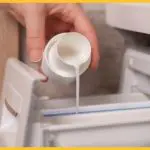Hey there! Ever wonder if your trusty fabric softener is causing more harm than good? Well, you're not alone. Fabric softener may seem like a laundry essential, but it could actually be wreaking havoc on your washer.
In this guide, we'll delve into the potential pitfalls of using fabric softener and how it may be silently sabotaging your washer's performance. We'll explore the sneaky residue buildup, the impact on your washer, and the potential damage to its components.
But don't worry, we've got you covered with alternative fabric softening methods and maintenance tips to keep your washer in top-notch condition. So, let's dive in and uncover the truth about whether fabric softener is ruining your washer.
Key Takeaways
- Fabric softeners leave behind a sticky residue in the washer.
- Residue buildup affects the cleanliness of the machine and laundry quality.
- Fabric softeners may contain harmful chemicals that are not environmentally friendly.
- Alternative options include using dryer balls or eco-friendly fabric softeners.
Fabric Softener Residue Buildup
If you're using fabric softener, you may be unaware of the potential for residue buildup in your washer. Fabric softeners often leave behind a sticky residue that can accumulate in your washing machine over time. This residue not only affects the cleanliness of your machine but also has the potential to impact the quality of your laundry.
The use of fabric softeners can also contribute to environmental impact as the chemicals in these products can be harmful to aquatic life and may not readily biodegrade.
To address this issue, consider using alternative laundry products such as dryer balls or environmentally friendly fabric softeners. Dryer balls are reusable and help soften clothes without leaving behind any residue in your washer. There are also eco-friendly fabric softeners available that are made from natural ingredients and are less harmful to the environment.
Impact on Washer Performance
Using fabric softener can impact your washer's performance in several ways.
Fabric residue buildup can clog the machine's inner mechanisms, leading to reduced efficiency and potential malfunctions.
Overloading and imbalance caused by fabric softener residue can also strain the washer, contributing to long-term wear and tear.
Fabric Residue Buildup
Fabric softener residue can hinder your washer's performance. Here's how to prevent buildup and avoid residue:
- Clean the Washer Regularly: Run a hot water cycle with vinegar or a washing machine cleaner to remove any fabric softener residue and prevent buildup.
- Use Fabric Softener Sparingly: Consider using less fabric softener or switching to dryer sheets to minimize residue in the washer.
- Wipe Down the Washer: After each use, wipe the fabric softener dispenser and the inside of the washer to remove any excess residue and prevent it from impacting the washer's performance.
Overloading and Imbalance
To ensure optimal washer performance, avoid overloading the machine with laundry or causing imbalance during the wash cycle. Preventing overloading is crucial for maintaining the efficiency and longevity of your washer. Overloading can lead to poor cleaning results, increased wear and tear on the machine, and even potential damage to the motor or drum.
Balancing loads for efficiency is equally important. When the laundry is unevenly distributed inside the washer, it can cause the machine to vibrate excessively, make loud noises, or even stop mid-cycle. This not only impacts the cleaning quality but also puts strain on the washer's components.
Long-Term Wear and Tear
Excessive wear and tear on your washer can significantly impact its performance and longevity. Over time, the constant strain from overloaded loads and imbalances can lead to costly repairs or even the need for a replacement. To prevent long-term damage and maintain your washer's optimal performance, consider the following maintenance techniques:
- Regular Cleaning: Clean the washer drum, detergent dispenser, and gasket to prevent buildup and mold growth.
- Balanced Loads: Avoid overloading the washer and ensure balanced loads to reduce strain on the machine's components.
- Professional Inspections: Schedule periodic inspections by a technician to identify and address any potential issues before they escalate.
Potential Damage to Washer Components
You may not realize it, but fabric softener buildup can lead to serious issues with your washer components.
The residue from fabric softener can clog the water inlet, causing water flow problems and affecting the overall performance of your machine.
Additionally, the chemicals in fabric softener can contribute to the corrosion of various parts, leading to potential damage and costly repairs.
Fabric Softener Buildup
Fabric softener buildup can potentially damage your washer components. Over time, the residue from fabric softener can accumulate in your washer, leading to various issues.
Here's how fabric softener buildup can harm your washer:
- Clogging: The residue can clog the dispensers and pipes, affecting the water flow and detergent distribution.
- Odor: Buildup can cause unpleasant odors in your washer and on your clothes, affecting the cleanliness of your laundry.
- Mechanical Issues: The excess residue may lead to strain on the washer's components, potentially causing malfunctions or breakdowns.
To prevent fabric softener buildup, consider using eco-friendly alternatives like vinegar or dryer balls. Additionally, regularly cleaning your washer and using the recommended amount of fabric softener can help prevent this issue.
Clogging Water Inlet
To prevent clogging in the water inlet and potential damage to your washer components, regularly clean the dispensers and pipes.
Preventing clogs in the water inlet is essential for maintaining water efficiency and prolonging the life of your washer. Over time, fabric softener residue can accumulate in the water inlet, leading to reduced water flow and potential blockages. This buildup not only affects the performance of your washer but can also put strain on the components, leading to potential damage.
By keeping the dispensers and pipes clean, you can ensure that water flows freely, maintaining optimal water efficiency and preventing clogs that could compromise the functionality of your washer.
It's a simple maintenance task that can go a long way in preserving the performance and longevity of your appliance.
Corrosion of Parts
Regular use of fabric softener can contribute to the corrosion of washer components, potentially causing damage to your appliance. This occurs due to chemical reactions between the fabric softener and the metal or plastic parts of the washer. The following preventive measures can help mitigate this risk:
- Use Fabric Softener Sparingly: Reducing the amount of fabric softener used in each load can decrease the chemical buildup in the washer, thus lowering the chances of corrosion.
- Clean Your Washer Regularly: Periodically cleaning the washer, especially the areas where fabric softener is dispensed, can help remove any residue that may lead to corrosion.
- Consider Alternative Softening Methods: Exploring alternative fabric softening methods, such as dryer balls or vinegar, can eliminate the need for fabric softener altogether, reducing the risk of chemical damage to washer components.
Extending Washer Lifespan
Using fabric softener regularly can significantly reduce your washer's lifespan. To extend your washer's lifespan, it's crucial to prioritize proper maintenance and fabric care.
Start by using fabric softener sparingly or consider using dryer balls as an alternative. Additionally, always follow the manufacturer's guidelines for detergent and softener usage.
Regularly clean your washer to prevent the buildup of fabric softener residue, which can lead to clogs and malfunctions. It's also important to check and clean the washer's dispensers and seals to prevent any potential damage.
Furthermore, be mindful of the amount of laundry you load into the washer to avoid overworking the machine.
Lastly, consider scheduling professional maintenance for your washer to ensure that all parts are functioning optimally. By implementing these practices, you can help maintain your washer's longevity and prevent unnecessary wear and tear.
Taking proactive steps to care for your washer won't only extend its lifespan but also ensure that your clothes are consistently cleaned and cared for.
Alternatives to Fabric Softener
Consider using dryer balls as an alternative to fabric softener to reduce the potential damage to your washer and extend its lifespan. Dryer balls are an excellent natural alternative to fabric softener, and they offer eco-friendly options that are safe for both your clothes and the environment.
Here are three reasons why dryer balls are a great alternative to fabric softener:
- Decreased Chemical Exposure: Dryer balls are typically made from natural materials such as wool or rubber, eliminating the need for chemical-laden fabric softeners. This reduces the risk of skin irritation and allergic reactions caused by harsh chemicals.
- Reduced Drying Time: Dryer balls help to separate and fluff your laundry, allowing hot air to circulate more efficiently. This leads to shorter drying times, saving energy and reducing utility costs.
- Long-Lasting and Cost-Effective: Unlike fabric softener, which needs to be replenished regularly, dryer balls can last for several years. This makes them a cost-effective and sustainable choice for softening your laundry.
Natural Fabric Softening Methods
If you're looking for a natural alternative to fabric softener, you can explore using vinegar or baking soda in your laundry routine. These eco-friendly alternatives provide DIY solutions for fabric softening without the use of commercial fabric softeners.
Vinegar, specifically white vinegar, can be added to the rinse cycle as a natural fabric softener. It helps to soften clothes, reduce static, and even acts as a natural deodorizer. Simply add half a cup of vinegar to the fabric softener dispenser or during the rinse cycle.
Baking soda, on the other hand, can be used to soften clothes and eliminate odors. Add half a cup of baking soda to the washing machine during the rinse cycle to naturally soften your laundry.
Both vinegar and baking soda are effective, eco-friendly alternatives that can help keep your clothes soft and fresh without the use of synthetic chemicals. These DIY solutions not only promote a more sustainable approach to laundry care but also contribute to a healthier environment and home.
Maintenance Tips for Your Washer
To maintain your washer's optimal performance, regularly clean the lint trap after each laundry cycle. This simple task prevents lint buildup, which can clog the drain and cause drainage issues.
Additionally, follow these maintenance tips to keep your washer running smoothly:
- Clean the Drum: Periodically clean the drum by running a wash cycle with hot water and a cup of white vinegar. This helps to remove any residue or buildup.
- Inspect and Clean the Seals: Check the door seals for any debris or mold accumulation. Wipe them down with a solution of water and mild detergent, and ensure they're completely dry to prevent mold growth.
- Maintain the Exterior: Wipe down the exterior of the washer with a damp cloth and mild detergent to keep it looking clean and prevent any buildup of grime or detergent residue.
Conclusion and Next Steps
Are you ready to take the next steps in maintaining your washer's longevity and performance?
After learning about the potential damage fabric softener can cause to your washer, it's important to implement alternative solutions.
One option is to switch to dryer balls or wool dryer balls as a natural alternative to fabric softener. These help soften clothes without leaving behind residue that can clog up your washer.
Additionally, consider using vinegar as a fabric softener alternative. It not only softens clothes but also helps prevent static cling and eliminates soap residue.
In terms of maintenance strategies, make sure to clean your washer regularly. Run a cleaning cycle with hot water and vinegar or a washer cleaner to remove any buildup caused by fabric softener.
Furthermore, always leave the washer door and detergent drawer open after use to allow for proper ventilation and drying, preventing mold and mildew growth.
Regularly checking and cleaning the washer's filter and dispensers is also crucial for preventing fabric softener residue buildup.
Frequently Asked Questions
Can Fabric Softener Residue Buildup Cause Skin Irritation or Allergic Reactions?
Using fabric softener can lead to skin sensitivity and allergic reactions due to residue buildup. It's important to maintain your washer to prevent this issue. Consider alternative methods for softening fabric to protect your skin and washer.
Will Using Fabric Softener Affect the Warranty on My Washer?
Using fabric softener won't affect your washer's warranty, but it can cause residue buildup. To maintain your washer, consider fabric softener alternatives like dryer balls or white vinegar. Regular cleaning and maintenance are key.
What Are Some Natural Alternatives to Fabric Softener That Won't Damage My Washer?
Want to protect your washer and use eco-friendly options? Consider natural alternatives like vinegar, baking soda, or wool dryer balls. DIY recipes and homemade solutions can soften your laundry without damaging your machine.
How Often Should I Clean My Washer to Prevent Fabric Softener Residue Buildup?
To prevent fabric softener residue buildup in your washer, clean it every 1-3 months. Consider using vinegar or baking soda as natural fabric softener alternatives to avoid potential damage. Regular maintenance will keep your washer running smoothly.
Are There Any Specific Maintenance Tasks I Should Perform to Keep My Washer in Good Condition if I Use Fabric Softener Regularly?
To maintain your washer when using fabric softener, regularly clean the dispenser and drum to prevent residue buildup. Consider fabric softener alternatives for eco-friendly options. Stay proactive in washer care to ensure longevity and performance.
- Is Chiffon Good Quality? - April 23, 2024
- Is Chiffon Like Organza? - April 23, 2024
- Is Chiffon 100% Polyester? - April 23, 2024





